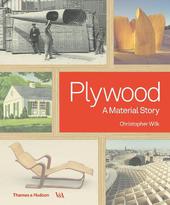
|
Plywood: A Material Story
Hardback
Main Details
| Title |
Plywood: A Material Story
|
| Authors and Contributors |
By (author) Christopher Wilk
|
| Physical Properties |
| Format:Hardback | | Pages:240 | | Dimensions(mm): Height 255,Width 210 |
|
| Category/Genre | Decorative wood and metalwork |
|---|
| ISBN/Barcode |
9780500519400
|
| Classifications | Dewey:674.834 |
|---|
| Audience | |
|---|
| Illustrations |
with 325 illustrations in colour and black and white
|
|
Publishing Details |
| Publisher |
Thames & Hudson Ltd
|
| Imprint |
Thames & Hudson Ltd
|
| Publication Date |
20 July 2017 |
| Publication Country |
United Kingdom
|
Description
Beautiful, sustainable and ubiquitous, plywood's worth far exceeds its general reputation. A manufactured wood product, it is capable of being moulded, which means that its applications are exceptionally wide-reaching - automobiles, architecture, furniture, sculpture, trains, boats and aeroplanes, to name a few. It is also this property that gives plywood-manufactured products their unique, stylish and timeless aesthetic, such as the famous dining chairs designed by architectural pioneers Charles and Ray Eames and Marcel Breuer. This book is a full exploration of the design, technological, social and cultural history of plywood. Beginning with the earliest examples of its usage in Ancient Egypt, the majority of the story takes place from the 1930s to the present day, first charting its prominent use in architecture, followed by the post-war DIY culture that revolved around the material. From the 1960s, plywood experienced a decline as it was replaced by cheaper substitutes, but since the 2000s has undergone a renaissance in appreciation of its aesthetic, practical and sustainable qualities. This is the first comprehensive study of the history of plywood and its myriad applications throughout the ages.
Author Biography
Christopher Wilk is Keeper of Furniture, Textiles and Fashion at the Victoria and Albert Museum. He is the author of books on Marcel Breuer, Frank Lloyd Wright and on the Thonet furniture company.
Reviews'Surprisingly gripping ... the story of plywood [...] has more plot developments and sudden changes of fortune than a 19th-century novel' - Apollo
|